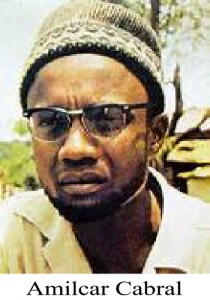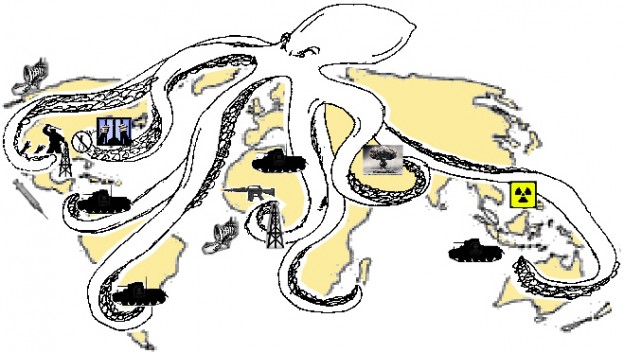“This is your last chance. After this, there is no turning back. You take the blue pill — the story ends, you wake up in your bed and believe whatever you want to believe. You take the red pill — you stay in Wonderland and I show you how deep the rabbit hole goes.”
— Morpheus, to Neo in The Matrix (1999)
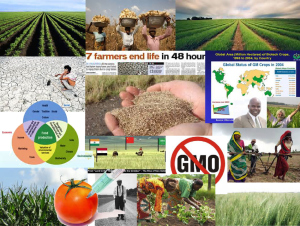 THE RABBIT HOLE: Seeds of Suspicion
THE RABBIT HOLE: Seeds of Suspicion
On September 26, 2014, the Africa Braintrust event was held at the John Wilson Convention Center in Washington, DC. The annual event, organized by United States Congress member Karen Bass (D-California), brings together a variety of speakers and panels to discuss issues of interest to Afrika and the Afrikan Diaspora. This year’s event centered around the August USA-Africa Summit, in which President Barack Obama met with 50 Afrikan heads of state to discuss USA-Afrika relations.
In earlier posts, we reported on the keynote address by former US Ambassador Johnnie Carson, the first of three panels that were held at the session, and the keynote address by Dr. Rajiv “Raj” Shah, Administrator of the United States Agency for International Development (USAID). Dr. Shah began his address by commenting about the continuing Ebola crisis, then discussed two signature USAID programs: Feed the Future and Power Africa. Last year, we attended a Congressional Policy Breakfast about Power Africa and the Electrify Africa Act, and we wrote about that session for this Web Site, including many of the concerns raised by community activists and concerned Afrikans about access to power in rural areas, questions of who primarily benefited from Power Africa and the potential environmental and human rights consequences.
Here, we will spend some time on USAID’s Feed the Future initiative. The stated aims are laudable: increasing the crop yields of rural farmers so the populace can eat instead of starving, so that children can play and go to school instead of wasting away through malnutrition, and so that countries can effectively feed their people instead of waging oppression and war over scarce resources. But the picture is far more complicated than that. The journey we will undertake here will delve into USAID’s checkered past in Latin America, examine the agency’s ties with major multinational biotech and agribusiness corporations, take a look at the concerns surrounding genetically modified (GM) food, scrutinize the issue of patents and food sovereignty (which is different from “food security”), and ask the question: Is this the Future we want for Afrika?
What Dr. Rajiv Shah of USAID Says About Feed the Future
First, here are the words of Dr. Rajiv Shah at the 2014 Africa Braintrust event as he touted USAID’s Feed the Future initiative:
“The first [of USAID’s current signature programs] is Feed the Future, and when 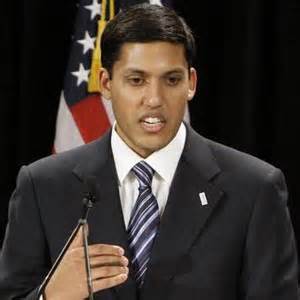 President Obama took office, he really made this the top developmental priority. The slide you’re looking at is a picture of an Ethiopian farmer and daughter collecting the harvest. In Ethiopia today, through Feed the Future, we’re working with DuPont and a host of local farming cooperatives to increase the farm yields for 35,000 maize farmers and their families. Today, as a part of our Feed the Future partnership, the government has liberalized its seed sector, has refined the way it protects private capital investments, has offered licenses and engaged foreign investors, and has built upon the innovation labs that were set up across American colleges and universities. Now, we measure the results of these efforts through legitimate and widespread household surveys, and we now know that as a result of this program in Ethiopia, public and private, Ethiopia has driven down the rate of hunger, of poverty, of stunting, which is an expression of malnutrition in children that robs them of their future, and has increased the rate of reduction of poverty and malnutrition three times in just the last two and a half years. That’s an extraordinary achievement, and as a result 160,000 children today who would have been hungry are now laughing, learning, playing, going to school, and not because we’re handing out more American food, but because we’re helping their farmers, mostly women, improve the productivity from their own labor and their own ingenuity. That kind of story is playing out in Ethiopia, but also in 14 other countries in Sub Saharan Africa. It’s playing out across more than 200 companies that have committed more than $10 billion of private investments. It’s playing out in the African Union that has reaffirmed this year is the year of agriculture for Africa, and has put into place a set of leadership commitments and policy reforms, and it plays out at a global level in last week’s announcement of global hunger levels that have come down by more than 40 million individuals, almost all of whom are in Sub Saharan Africa over the last three or four years.
President Obama took office, he really made this the top developmental priority. The slide you’re looking at is a picture of an Ethiopian farmer and daughter collecting the harvest. In Ethiopia today, through Feed the Future, we’re working with DuPont and a host of local farming cooperatives to increase the farm yields for 35,000 maize farmers and their families. Today, as a part of our Feed the Future partnership, the government has liberalized its seed sector, has refined the way it protects private capital investments, has offered licenses and engaged foreign investors, and has built upon the innovation labs that were set up across American colleges and universities. Now, we measure the results of these efforts through legitimate and widespread household surveys, and we now know that as a result of this program in Ethiopia, public and private, Ethiopia has driven down the rate of hunger, of poverty, of stunting, which is an expression of malnutrition in children that robs them of their future, and has increased the rate of reduction of poverty and malnutrition three times in just the last two and a half years. That’s an extraordinary achievement, and as a result 160,000 children today who would have been hungry are now laughing, learning, playing, going to school, and not because we’re handing out more American food, but because we’re helping their farmers, mostly women, improve the productivity from their own labor and their own ingenuity. That kind of story is playing out in Ethiopia, but also in 14 other countries in Sub Saharan Africa. It’s playing out across more than 200 companies that have committed more than $10 billion of private investments. It’s playing out in the African Union that has reaffirmed this year is the year of agriculture for Africa, and has put into place a set of leadership commitments and policy reforms, and it plays out at a global level in last week’s announcement of global hunger levels that have come down by more than 40 million individuals, almost all of whom are in Sub Saharan Africa over the last three or four years.
“Today, as a part of our Feed the Future partnership, the government has liberalized its seed sector, has refined the way it protects private capital investments, has offered licenses and engaged foreign investors, and has built upon the innovation labs that were set up across American colleges and universities.”
— Dr. Rajiv Shah, Administrator of USAID
“These are extraordinary successes and gains, and I just want to note and thank the United States Congress and its leaders, including Representative [Karen] Bass, for introducing, on a bipartisan basis in both the House and the Senate, Feed the Future legislation that will authorize this program into law and ensure that we can stick with it, using this model of development to continue to drive down hunger and poverty and drive up agricultural investment and growth for decades to come. So I would like to take this moment to ask for your support for Feed the Future, and that you support Representative Bass and that you support the bipartisan members of the House and Senate that are going to try to make this happen, we hope, in the Lame Duck Session this year, because I think it’s telling that our political leaders, at a time that, sometimes, is a little fractured and a little partisan, can come together to support this kind of an effort, executed to this level of excellence. So thank you for your leadership, Representative Bass. …”
We thank Rep. Bass for her continued commitment to bring information to her constituents and to concerned Afrikans and Afrikan Diasporans. Her Africa Braintrust event provides an opportunity for us to learn about the analysis and plans of a number of activists, scholars and government officials from the United States and Afrika. That being stated, it is necessary for us to now compare the words of Dr. Shah to what others around the world have said, what the corporate partners of USAID have said and done, the warnings of food activists and farmers’ advocates, and what the implications will be for Afrika as the next frontier (target?) of USAID’s Feed the Future initiative. We will reference and quote a number of articles, statements and Web Sites during our journey, and we include the locations of these articles, analyses and statements so you can look them up for yourself, and perhaps dig even deeper down the rabbit hole.
What Latin American Activists Say: USAID’s influence in Latin America & The Caribbean
An article dated July 21, 2012, titled ALBA Expels USAID from Member Countries (http://alethonews.wordpress.com/2012/06/22/alba-expels-usaid-from-member-countries/), translated by Rachael Boothroyd for the Web Site http://venezuelaanalysis.com, reported on the Resolution from the Political Council of the Bolivarian Alliance for the Peoples of Our America (ALBA) for the immediate withdrawal of USAID from member countries of the alliance. The Resolution goes as follows:
On behalf of the Chancellors of the Bolivarian Alliance for the Peoples of Our America, gathered in Rio de Janeiro, Federal Republic of Brazil, on June 21st 2012.
Given the open interference of the United States Agency for International Development (USAID) in the internal politics of the ALBA countries, under the excuse of “planning and administering economic and humanitarian assistance for the whole world outside of the United States,” financing non-governmental organizations and actions and projects designed to destabilise the legitimate governments which do not share their common interests.
Knowing the evidence brought to light by the declassified documents of the North American State Department in which the financing of organisations and political parties in opposition to ALBA countries is made evident, in a clear and shameless interference in the internal political processes of each nation.
Given that this intervention of a foreign country in the internal politics of a country is contrary to the internal legislation of each nation.
On the understanding that in the majority of ALBA countries, USAID, through its different organisations and disguises, acts in an illegal manner with impunity, without possessing a legal framework to support this action, and illegally financing the media, political leaders and non-governmental organisations, amongst others.
On the understanding that through these financing programmes they are supporting NGOs which promote all kind of fundamentalism in order to conspire and limit the legal authority of our states, and in many cases, widely loot our natural resources on territory which they claim to control at their own free will.
Conscious of the fact that our countries do not need any kind of external financing for the maintenance of our democracies, which are consolidated through the will of the Latin American and Caribbean people, in the same way that we do not need organisations in the charge of foreign powers which, in practice, usurp and weaken the presence of state organisms and prevent them from developing the role that corresponds to them in the economic and social arena of our populations.
We resolve to:
Request that the heads of state and the government of the states who are members of the Bolivarian Alliance for the Peoples of Our America, immediately expel USAID and its delegates or representatives from their countries, due to the fact that we consider their presence and actions to constitute an interference which threatens the sovereignty and stability of our nations.
In the city of Rio de Janeiro, Federal Republic of Brazil, June 21st 2012.
Signed by: The government of the Pluri-national state of Bolivia, The government of the Republic of Cuba, The government of the Republic of Ecuador, The government of the Commonwealth of Dominica, The government of the Republic of Nicaragua, The government of the Bolivarian Republic of Venezuela.
Why did ALBA make such a statement? Surely, USAID doesn’t use its status as a global “humanitarian” agency (Isn’t “International Development” their last name?)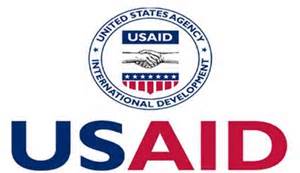 cannot be attempting to destabilize legitimate governments, can they? Well, perhaps we need more information and testimony, such as the following article from the Web Site http://www.telesurtv.net/english/news/ALBA-Strongly-Condemns-USAID-Plot-in-Cuba-20140808-0043.html, published August 8, 2014, titled The member states of the Bolivarian Alliance for Peoples of Our America (ALBA) demanded the United States cease its subversive actions against Cuba. Here is an excerpt:
cannot be attempting to destabilize legitimate governments, can they? Well, perhaps we need more information and testimony, such as the following article from the Web Site http://www.telesurtv.net/english/news/ALBA-Strongly-Condemns-USAID-Plot-in-Cuba-20140808-0043.html, published August 8, 2014, titled The member states of the Bolivarian Alliance for Peoples of Our America (ALBA) demanded the United States cease its subversive actions against Cuba. Here is an excerpt:
The statement released this Thursday follows revelations about the recruitment and employment of young Latin American people since 2009 in a bid to convert contemporary Cubans into “agents of change” and promote political dissent on the island.
The U.S. based agency Associated Press revealed on Sunday that the U.S. agency for International Development (USAID) sent a group of young people from Costa Rica, Venezuela and Peru to Cuba under the guise of carrying out health and social projects, when in reality their main goal was to find and encourage anti-government activists.
In the text, ALBA expressed its “indignation”, describing the project as “immoral”.
“The ALBA condemns this new plan against Cuba, and demands and end to the subversive, illegal actions partly covered by the U.S. government, that violate the sovereignty and right of the Cuban people to self-determination.” added the communiqué.
“The countries of ALBA express their deep solidarity with the Cuban Republic and demand the United States respect the Cuban people’s will in continuing to improve its economic and social model, as well as the consolidation of its democracy, without any external interferences.”
An analysis of USAID’s objectives in Latin America was presented last month in an article on the Web Site http://www.telesurtv.net/english/opinion/USAIDin-Latin-America-More-Than-Just-Aid-20141027-0055.html, USAID in Latin America: More Than Just Aid, published 27 October 2014, which said, in part:
After being expelled from numerous Latin American countries for dubious activity, the United States organization USAID has developed a reputation of an organization that while providing aid is also developing ways to undermine governments in a number of the continent’s countries.
According to their website, USAID’s mission is “furthering America’s interests, while improving lives in the developing world.” However in practice, they may well be furthering the United States interests, but not by improving lives in the developing world but by supporting the activities of groups that are opposed to democratically elected governments.
The most recent damning revelations are that the agency not only had attempted to create a twitter style social media network in Cuba to undermine the government, but on top of this an Obama administration program secretly dispatched young Latin Americans to Cuba using the cover of health and civic programs to provoke political change in order to overthrow Castro’s government, which the United States has been trying to do for over 50 years now, with no success.
After it was revealed that USAID had been interfering in Cuba, the House Oversight and Government Reform Chairman Jason Chaffetz said, “That is not what USAID should be doing … USAID is flying the American flag and should be recognized around the globe as an honest broker of doing good. If they start participating in covert, subversive activities, the credibility of the United States is diminished.”
But USAID’s track record of engaging in subversive activities is a long one, and U.S. credibility as an “honest broker” was lost many years ago.
The USAID operations in Latin America, which are overseen by what is known as the “Office of Transition Initiatives” (OTI), is a way for the U.S. to promote its interests through soft power. The U.S. calls these projects aiding in “transition”, whereas in reality it is nothing but meddling in the internal affairs of sovereign nations. They work with many different NGOs and private companies, all under the guise of providing aid to developing nations.
USAID have engaged in activities to undermine democratically elected governments in Venezuela, Cuba, Bolivia and Haiti and interfered in Brazil, Ecuador and most likely other nations. …
But not only is USAID’s image tattered in many parts of Latin America, it is also held in suspicion among several activists in Ayiti (Haiti). A report critical of USAID, which was released by the Center for Economic and Policy Research (CEPR), was detailed in the April 3, 2013 article New Report on U.S. Aid to Haiti Finds “Troubling” Lack of Transparency, Effectiveness (http://www.cepr.net/index.php/press-releases/press-releases/new-report-on-us-aid-to-haiti-finds-troubling-lack-of-transparency-effectiveness). Among the article’s revelations:
A new report from the Center for Economic and Policy Research (CEPR) identifies significant problems with the delivery of U.S. aid in Haiti and finds an overall lack of transparency on how the billions of dollars obligated for U.S. assistance to Haiti are being used. The report, “Breaking Open the Black Box: Increasing Aid Transparency and Accountability in Haiti,” by CEPR Research Associate Jake Johnston and Senior Associate for International Policy Alexander Main, examines the effectiveness of U.S. assistance to Haiti, how it is being administered, to what extent it is adhering to the “USAID Forward” reform agenda and what steps can be taken to ensure its more effective and transparent delivery.
“Billions in U.S. aid money are going to Haiti with little transparency to ensure that it is being used effectively,” paper co-author Jake Johnston said. “The situation for many people in post-quake Haiti is especially daunting, but for USAID it has been business as usual. No care has been taken to ensure that U.S. taxpayer dollars are being best utilized in Haiti.”
The report notes that the few audits and evaluations of USAID’s programs in Haiti since the earthquake present a “troubling picture of the manner in which U.S. relief and reconstruction efforts have been conducted so far.” Contractors have hired far fewer Haitians than promised, Haitian businesses were largely excluded, goals were not met, there was inadequate supervision of grantees, and USAID had not conducted internal financial reviews of contractors.
The paper shows that of the $1.15 billion in contracts and grants awarded since the 2010 earthquake, over half went to the top 10 recipients of global USAID awards, with the largest recipient being the for-profit company Chemonics International Inc., the single largest recipient of USAID funds worldwide aside from the World Bank and U.N. Meanwhile, just 0.7 percent of USAID awards have gone directly to Haitian businesses or organizations. …
The paper notes that despite USAID’s “Forward” reform agenda, the agency has blocked disclosure of additional information, including through Freedom of Information Act requests. …
“Without transparency, not only is it impossible for U.S. taxpayers to know what is being done with their money, but the Haitian government and the Haitian people have little opportunity to ensure that U.S.-funded projects actually assist Haiti in rebuilding and dealing with ongoing urgent humanitarian needs,” paper co-author Alex Main said.
So, there is evidence that USAID has acted, in the recent past, to undermine governments in Latin America, and that many of those governments have expelled USAID employees as a result. There are also reports of a lack of transparency as to how funds are spent in countries, such as Ayiti (Haiti), where USAID has purportedly acted in a humanitarian capacity. What has that to do with Feed the Future, and why should we assume that USAID will act in a similar fashion in Afrika?
What Food Activists Say: USAID’s Support of GMOs
Another troubling aspect of USAID’s practices over the years has been the agency’s consistent support of corporations that are engaged in the promotion of genetically modified (GM, or GMO for “genetically modified organism”) food, which goes back over a decade. An October 2002 report by Greenpeace (http://greenpeace.co/uk) titled USAID and GM Food Aid, states, among other things:
In August 2002, Andrew Natsios of the United States Agency for International Development (USAID) accused environmental groups of endangering the lives of millions of people in southern Africa by encouraging local governments to reject genetically modified (GM) food aid. Mr. Natsios said, “They can play these games with Europeans, who have full stomachs, but it is revolting and despicable to see them do so when the lives of Africans are at stake.” He added, “The Bush administration is not going to sit there and let these groups kill millions of poor people in southern Africa through their ideological campaign.”
In fact, the cynical manipulators of the famine in Africa are the US government, USAID and the GM industry. They are using the current situation to force the introduction of GM crops on countries desperate for food aid. There are numerous sources of non-GM aid available around the world, including the USA. Using these sources is the best way to both feed people and maintain their dignity, yet the US has made a clear policy decision to only supply GM contaminated aid from US suppliers. Aid agencies, the EU and UK Government all believe that best practice in emergency aid is to provide support to the United Nations World Food Programme (WFP) in the form of cash, so that it can buy grain from the quickest and most cost effective sources. The only organisation that thinks otherwise is USAID. US policy thus impedes aid from generating maximum benefit.
It is clear that the current program of aid donation is the latest twist in a crude 10-year marketing campaign, led by USAID and designed to facilitate the introduction of US-developed GM crops into Africa. …
The simple fact is that USAID has chosen to supply GM maize as food aid, even though there are numerous grain companies in the USA from whom they could supply certified non-GM grain. …
During negotiations on the Cartagena Biosafety Protocol, part of a UN sponsored international agreement to control the movement of GM crops around the world, African countries made it clear that they did not want to become a test site or dumping ground for unwanted GM food. Yet this now seems to be the case. Indeed, in comments largely ignored at the time, the UK Chief Scientist Professor David King said that the Bush Administration’s efforts to force GM foods into Africa in the form of food aid is “a massive human experiment. Professor King questioned the morality of the Administration’s desire to introduce GM into African countries, where people are facing starvation in the coming months. …
USAID has become increasingly frustrated over countries not taking GM contaminated aid – a US official was quoted as saying, “beggars can’t be choosers.” USAID clearly states, however, that among other things its role is to “integrate GM into local food systems” and “spread agricultural technology through regions of Africa.” US Secretary of State Colin Powell said in Johannesburg, “In the face of famine, several governments in southern Africa have prevented critical US food assistance from being distributed to the hungry by rejecting GM corn which has been eaten safely around the world since 1995.” …
There is much more to this article, including an analysis of how the US’s specific means of delivering aid makes this result not only possible, but likely, as well as USAID’s connections with global agribusiness and biotech corporations and its efforts to further the opening of markets (“trade liberalization”) and the enforcement of patents, hardly an aid imperative. The whole article can be found at the Web Site www.greenpeace.co.uk.
There is more still to this part of the story, which we will cover in more detail when our journey takes us to India. But now, we wish to share with you the words of an executive of Monsanto, one of the largest biotech and agribusiness corporations in the world and a major corporate partner of USAID. Monsanto is quite proud of its role in pushing GMO food on the world, primarily through its proprietary hybridized seeds. These seeds have been marketed to farmers in the United States, India and other parts of the world. While Monsanto claims these “magic seeds” have brought nothing but benefit to farmers around the world, many of the farmers themselves have quite a different tale to tell. But first, the words of this Monsanto executive, which makes it clear that USAID has been an enthusiastic backer of GMO food and biotechnology for quite some time, and that they enjoy a rather cozy relationship with USAID.
What Monsanto Says: The Promise of GMO Foods
 Following are excerpts from a statement of Mr. Gerald Steiner, Executive Vice President, Sustainability and Corporate Affairs, Monsanto Company, before the House Foreign Affairs Committee, July 20, 2010, which was posted on Monsanto’s Web Site, http://www.monsanto.com/newsviews/pages/feed-the-future-initiative.aspx:
Following are excerpts from a statement of Mr. Gerald Steiner, Executive Vice President, Sustainability and Corporate Affairs, Monsanto Company, before the House Foreign Affairs Committee, July 20, 2010, which was posted on Monsanto’s Web Site, http://www.monsanto.com/newsviews/pages/feed-the-future-initiative.aspx:
Thank you for inviting me to testify today on a vital new initiative, Feed the Future (www.feedthefuture.gov), which provides a framework for addressing one of our planet’s great needs, and great opportunities – the use of more productive and sustainable agricultural development to reduce hunger and poverty.
Our company has made a three-pronged commitment to improve sustainable agriculture: We will do our part to help farmers double yields in our core crops of corn, cotton and soybeans between 2000 and 2030, while producing each bushel or bale with one-third fewer resources in aggregate (such as land, water and energy). And, just as importantly, in so doing we will help farmers to earn more and improve the lives of their families and rural communities.
… Our cornerstone strategy is to actively engage and seek collaboration from a wide range of partners in the public sector, private sector, academia and civil society.
… USAID Administrator Dr. Rajiv Shah, when introducing Feed the Future to the Chicago Council Symposium on Agriculture and Security in May, asked for private-sector input. “Tell us what countries and donors can do to reduce constraints on business operations,” he said. “And please explore with us whether our tools to encourage investment . . . would help you make the commitment to invest greater resources in these specific value chains and countries.” …
… At Monsanto, we develop improved seed through advanced breeding as well as biotechnology.
… Cutting-edge science and technology is built into the seed itself, which can be planted by an African farmer using a hoe, or an American farmer using sophisticated machinery. …
… These require systems approaches that begin with improved seeds, access to fertilizer and extension training, and end with functioning markets. What we need in order to effectively contribute – as noted in the Feed the Future Guide and implied in Dr. Shah’s question – are enabling business environments.
That includes policies that provide predictability, such as reliable, science-based regulatory systems, as well as laws that protect the fruits of our research and development and the ability to fairly compete in the marketplace. …
I am encouraged by Feed the Future’s endorsement of business- enabling policies, and by its support for public-private partnerships. … Monsanto is engaged in a variety of public- private partnerships in markets around the world. …
… we are equally focused on public- private partnerships that help farmers access and use agricultural technology to produce more abundant crops, while using fewer resources. One of these is Project Sunshine, a partnership with the government of the Indian state of Gujarat and local NGOs, which has helped thousands of subsistence farmers to increase corn yields and break the cycle of poverty. …
Farmers who planted hybrids doubled, or even tripled their corn yield – and, as a result, doubled or tripled their income. Those who accepted free seed and inputs in 2008 were able to purchase them at minimal cost the following year. By 2010, Project Sunshine generated additional farm income of $27 million, improving living standards and increasing spending power so that families can afford to educate their children. …
Again, these are Mr. Steiner’s own words. Monsanto is clearly quite proud of its work in the development and promotion of GMO foods and its relationship with USAID. Mr. Steiner’s mention of Project Sunshine is also important, for it is the subject of a case in the Gujarat State of India that we will examine in a few minutes.
What Food Activists Say: Monsanto’s Plans for Control of India’s Food and Farmer Suicides
Mr. Steiner’s statement above extols the benefits of GMO seeds for the farmers of India, but as we have already stated, numerous voices are saying something entirely different. We will quote parts of some of the articles below and will simply refer to others, with their Web addresses included so you can read the articles in their entirety.
A Daily Mail article by Andrew Malone (http://www.dailymail.co.uk/news/article-1082559/The-GM-genocide-Thousands-Indian-farmers-committing-suicide-using-genetically-modified-crops.html) helped tell the world about The GM genocide: Thousands of Indian farmers are committing suicide after using genetically modified crops with this opening statement:
When Prince Charles claimed thousands of Indian farmers were killing themselves after using GM crops, he was branded a scaremonger. In fact, as this chilling dispatch reveals, it’s even WORSE than he feared.
Sourcewatch (http://www.sourcewatch.org/index.php?title=Monsanto_in_India) released a report, Monsanto in India, which goes into more detail about the crisis of farmer suicides. Here is part of that article:
Farmers in India are finding that the “biotechnology revolution” is having a devastating effect on their crop lands and personal debt levels. “In 1998, the World Bank’s structural adjustment policies forced India to open up its seed sector to global corporations like Cargill, Monsanto, and Syngenta. The global corporations changed the input economy overnight. Farm saved seeds were replaced by corporate seeds which needed fertilizers and pesticides and could not be saved” says Vandana Shiva, leader of the movement to oust Monsanto from India in her 2004 article The Suicide Economy Of Corporate Globalisation. “As seed saving is prevented by patents as well as by the engineering of seeds with non-renewable traits, seed has to be bought for every planting season by poor peasants. A free resource available on farms became a commodity which farmers were forced to buy every year. This increases poverty and leads to indebtedness. As debts increase and become unpayable, farmers are compelled to sell kidneys or even commit suicide. …”
UPDATE: “Since 1997, 182,936 Indian farmers have taken their lives and the numbers continue to rise. According to a recent study by the National Crime Records Bureau, 46 Indian farmers kill themselves every day – that is roughly one suicide every 30 minutes – an alarming statistic in a country where agriculture is the economic mainstay“.
Yet even this number may be underestimated. According to P. Sainath, rural affairs editor of The Hindu, “the states where these [figures] are gathered leave out thousands from the definition of ‘farmer’ and, thus, massage the numbers downward. For instance, women farmers are not normally accepted as farmers (by custom, land is almost never in their names). They do the bulk of work in agriculture – but are just ‘farmers’ wives’.” This classification enables governments to exclude countless women farmer suicides. They will be recorded as suicide deaths – but not as ‘farmers’ suicides’. Likewise, many other groups, too, have been excluded from that list.”
This has been called a genocide. Says the Deccan Herald, “Bt cotton requiring more water than hybrid cotton, was knowingly promoted so as to allow the seed industry to make profits. What happens to the farmers as a result was nobody’s concern. And never was. … Strange, the country has already jumped into the second phase of green revolution without first drawing a balance sheet of the first phase of the technology era. Such an approach will only worsen the crisis, and force more farmers to commit suicide or abandon their farms. As a result, India is sure to witness the worst environmental displacement the world has known and this will be in the field of agriculture.”
Others have also written extensively on Monsanto’s GMO seeds and their implication in the wave of farmer suicides in India. An article on Global Research (http://www.globalresearch.ca/killer-seeds-the-devastating-impacts-of-monsanto-s-genetically-modified-seeds-in-india/28629) titled KILLER SEEDS: The Devastating Impacts of Monsanto’s Genetically Modified Seeds in India by Iqbal Ahmed, January 12, 2012, states:
Monsanto’s operation in India illustrates monopolization and manipulation of the market economy, tradition, technology, and misgovernance. The world’s largest producer of genetically engineered seeds has been selling genetically modified (GM) in India for the last decade to benefit the Indian farmers – or so the company claims.
Prominent physicist, food and farmers’ activist and 1993 Right Livelihood Award winner Dr. Vandana Shiva (founder of Navdanya http://www.navdanya.org/) has 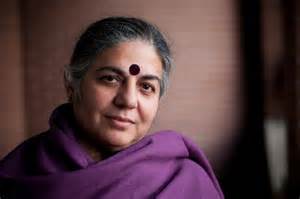 authored more than 20 books and 500 papers in leading scientific and technical journals. One of them, available on http://www.globalresearch.ca/the-seeds-of-suicide-how-monsanto-destroys-farming/5329947, is The Seeds Of Suicide: How Monsanto Destroys Farming (Global Research, March 13, 2014 and Asian Age and Global Research, April 5, 2013), which goes into detail to allege that
authored more than 20 books and 500 papers in leading scientific and technical journals. One of them, available on http://www.globalresearch.ca/the-seeds-of-suicide-how-monsanto-destroys-farming/5329947, is The Seeds Of Suicide: How Monsanto Destroys Farming (Global Research, March 13, 2014 and Asian Age and Global Research, April 5, 2013), which goes into detail to allege that
Monsanto’s talk of ‘technology’ tries to hide its real objectives of control over seed where genetic engineering is a means to control seed.
Tony Cartalucci, a Bangkok-based geopolitical researcher and writer for the online magazine “New Eastern Outlook”, wrote an article for Global Research on March 14, 2014 (http://www.globalresearch.ca/gmo-agribusiness-in-india-grassroots-action-against-monsanto-cargill-sygenta/5373420) titled GMO Agribusiness in India: Grassroots Action against Monsanto, Cargill, Sygenta, Grassroots Activism Builds Wall Against Western Imperialism.
Also from Global Research, Colin Todhunter wrote an article on June 20, 2014 titled Criminalising Dissent in India against GMOs and Monsanto (http://www.globalresearch.ca/criminalising-dissent-in-india-against-gmos-and-monsanto/5387779).
There have been some victories, however small, for farmers and food activists in Indian courts and government agencies. The Project Sunshine seeds that Monsanto executive Steiner was touting in his statement above, for example, were withdrawn from the project in 2012, as the following article from DNA India, Sun no longer shines on GM maize seeds (http://www.dnaindia.com/india/report-sun-no-longer-shines-on-gm-maize-seeds-1681371, April 27, 2012) explains:
Gujarat government on Thursday withdrew propriety seeds of multinational company (MNC) Monsanto from ongoing Project Sunshine of the government. Non Government Organisations (NGOs) and anti-GM lobby hailed the move.
“We cannot let our food security be compromised by giving unusual leverages to MNCs,” said Prabhakar Kelkar, national president – Bharatiya Kisan Sangh (BKS). Talking at a press meet in the city on Thursday, he said that the move is the first step towards ensuring food security in the country.
Popularly known after its brand name ‘Prabal’, Monsanto seeds are double-crossed hybrid of maize that was being distributed to tribal farmers of Gujarat under Project Sunshine. …
Speaking on the issue, agriculture minister Dilip Sanghani said that government was purchasing Monsanto seeds to be given to ‘Project Sunshine’ farmers, but it has now stopped doing so. …
Earlier, use of Prabal seeds by government in Project Sunshine invited criticism from BKS, scientists and NGOs. … It is also alleged that authorities selected the seeds despite adverse opinion of agriculture scientists.
Another article apparently sought to clarify the issue, however, by stating that the Gujarat government did not “ban” the seeds; it only ceased distributing them. The article Gujarat says ‘no’ to ban on distribution of Monsanto hybrid maize seed (http://www.thehindu.com/todays-paper/tp-national/gujarat-says-no-to-ban-on-distribution-of-monsanto-hybrid-maize-seed/article3386089.ece) is excerpted below:
Despite opposition from various quarters, including the agricultural experts and the farmers’ organisations, the Gujarat government has refused to impose a total ban on distribution of the Monsanto hybrid maize seed named “Prabal” to the farmers in the State, particularly the tribal agriculturists. …
“The State government does not distribute seeds, it only certifies for distribution, and therefore there is no question of stopping the distribution,” the official said. He said the State government had not taken any decision to “ban” the distribution of Monsanto seeds, but it had only decided to allow distribution of other varieties of seeds also along with Prabal if farmers chose it.
The State government had been distributing Prabal, the hybrid maize seeds developed by the American multi-national company Monsanto, to the tribal farmers since 2008. The agricultural scientists and experts, however, maintain that Prabal, which required more water and fertilizers than other varieties and needed deep soil, was not suitable for the usually dry and rain-fed areas like Gujarat, and particularly for the poor tribal farmers. …
Then, in July 2013, an appeals court and India’s Intellectual Property Appellate Board rejected two patent applications from Monsanto for varieties of their GMO seed, as reported in the July 15, 2013 Nation of Change article Monsanto’s Patent Appeal Rejected by Indian Government, Saving Farmers, Food and Lives by Christina Sarich (http://www.nationofchange.org/monsanto-s-patent-appeal-rejected-indian-government-saving-farmers-food-and-lives-1373891665):
Part of the reason Monsanto was not able to pass their patents is because the 1970 Patent Act excluded patents in agriculture and medicine. The act had to be amended when India signed the World Trade Agreement (including sections covering Trade Related Intellectual Property Rights). Strong sections of the Act, like ‘what are not inventions’ in clause 3 and the especially 3d, ‘excludes as inventions the mere discovery of any new property or new use for a known substance,’ were key in Monsanto’s refusal. It was this same clause that kept the Novartis pharmaceutical company from patenting a known cancer-curing drug. They tried to challenge this in the Supreme Court of India, but lost. Many are saying that what the Novartis case is to our global Right to Health, the new refusal of Monsanto’s patents are the same Right to Seed and Right to Livelihood for farmers.
There are supposedly 27,000 farmers who have committed acts similar to a farmer in Bhiwandi taluka, India, who consumed pesticide after his crops failed miserably due to draught and increased debts to companies like Monsanto. Farmers have been petitioning the Indian government to help lift them out of poverty. While not every farmer blames Monsanto directly, the majority of these farmer suicides happen in the cotton belt, where Monsanto controls 95% of the cotton seed supply with Bt cotton. The costs of the seeds jumped more than 8,000% with the introduction of Bt cotton. …
Monsanto’s attempts to patent further seeds and bankrupt entire generations of farmers and their families that have successfully farmed for centuries have been halted – at least in India – for now.
What Monsanto Says II: No Connection Between GMO and Indian Farmer Suicides
Monsanto, of course, denies any connection between their GMO seeds and the farmer suicides in India. On the Monsanto Web Site (http://www.monsanto.com/newsviews/pages/india-farmer-suicides.aspx), a number of statements designed to give the corporation’s side of this and other controversies can be found. In the piece titled Is Bt or GMO Cotton the Reason for Indian Farmer Suicides, Monsanto makes the following contentions (among others):
Farming in rural India brings with it a set of systemic and social issues that can lead to hopelessness among farmers and an unacceptably frequent occurrence of farmer suicides. Significant research has documented the problem is complex and disproved the claim that GMO crops are the leading cause. …
The international community has conducted several studies to identify the reasons for the unacceptably frequent occurrence of farmer suicides in India over the last three decades. For example:
A 2008 study by the International Food Policy Research Institute found indebtedness among Indian farmers can be linked to numerous causes, including a lack of reliable credit, changes in government policies, cropping patterns, plant and insect resistance to pesticides, and even shifts in the crops planted on the farm.
The Council for Social Development’s (CSD) June 2012 study, Socio-Economic Impact assessment of Bt Cotton in India, identified the key reasons leading to farmer suicides as lack of irrigation facilities, unavailability of timely credit and fluctuating cotton prices over the years. …
Despite claims by those who oppose GMO crops, research also demonstrates there is no link between Indian farmer suicides and the planting of GMO cotton.
Farmer suicides in India have been a problem for nearly three decades – starting well before the first GM crop (biotech or Bt cotton) was introduced in 2002. …
One contention that is not answered is that the problems with irrigation and resistance to pests might have been triggered by the need for larger volumes of water for Monsanto’s GMO crops in areas where irrigation was not available as well as increasing resistance of pests when they adapted to the GMO varieties and the new pesticides that were required to ensure their cultivation. Also not mentioned was the “shifts in the crops planted” from cycling through different crops, as farmers have done for centuries before the advent of industrial farming, to “monocropping” to conform with the demands of factory (industrial) farming, as is promoted and practiced in many corporate agricultural environments.
“Terminator” Seeds and “Terminator” Courts: Threatening the Right to Save Seeds?
There has also been discussion about the several-thousand-year-old practice of seed saving, and the degree to which this age-old agricultural tradition is being threatened by the patenting of seeds by corporations like Monsanto. Allegations of the development of a “Terminator” seed that produces sterile or non-viable offspring (to require farmers to buy seed every year instead of recycling the seeds from a previous planting) have been categorically denied by Monsanto (despite their acquisition in 2006 of a company that was conducting experiments in this very same technology), but Monsanto jealously guards its seed by patenting it, and then threatening farmers who try to save their seed (instead of buying it again from Monsanto) with lawsuits. An article on the Web Site http://thirdworldtraveler.com, Terminator Seeds Threaten an End to Farming by Hope Shand and Pat Mooney (rafiusa@rafi.org, www.rafi.ca), Earth Island Journal, Fall, 1998, noted that
In March 1998, Delta & Pine Land Co. and the US Department of Agriculture (USDA) announced they had received a US patent on a new genetic technology designed to prevent unauthorized seed-saving by farmers.
The patented technology enables a seed company to genetically alter seed so that the plants that grow from it are sterile; farmers cannot use their seeds. The patent is broad applying to plants and seeds of all species including both transgenic (genetically engineered) and conventionally-bred seeds. The developers of the new technology say that their technique to prevent seed-saving is still in the product development stage, and is now being tested on cotton and tobacco. They hope to have a product on the market sometime after the year 2000.
Monsanto was implicated in this as well, based on its attempt to buy Delta & Pine Land in 1998 (which failed) and its ultimate success in acquiring that company around 2006. Monsanto, however, has denied that it has any intentions to develop and market “Terminator” seed technology. Again, from the Monsanto Web Site (http://www.monsanto.com/newsviews/pages/terminator-seeds.aspx), Myth: Monsanto Sells Terminator Seeds:
Fact: Monsanto has never commercialized a biotech trait that resulted in sterile – or “Terminator” – seeds. Sharing the concerns of small landholder farmers, Monsanto made a commitment in 1999 not to commercialize sterile seed technology in food crops. We stand firmly by this commitment, with no plans or research that would violate this commitment.
Perhaps this is true, and perhaps Monsanto has stood by the commitment it says it made to “smallholder farmers” in 1999 to not pursue “Terminator” technology in its seeds. Monsanto does, however, publicly defend its practice of prosecuting farmers who attempt to save their seeds, again from their Web Site, http://www.monsanto.com/newsviews/pages/why-does-monsanto-sue-farmers-who-save-seeds.aspx, Why Does Monsanto Sue Farmers Who Save Seeds?
When farmers purchase a patented seed variety, they sign an agreement that they will not save and replant seeds produced from the seed they buy from us. More than 275,000 farmers a year buy seed under these agreements in the United States. Other seed companies sell their seed under similar provisions. They understand the basic simplicity of the agreement, which is that a business must be paid for its product. The vast majority of farmers understand and appreciate our research and are willing to pay for our inventions and the value they provide. They don’t think it’s fair that some farmers don’t pay.
A very small percentage of farmers do not honor this agreement. Monsanto does become aware, through our own actions or through third-parties, of individuals who are suspected of violating our patents and agreements. …
Whether the farmer settles right away, or the case settles during or through trial, the proceeds are donated to youth leadership initiatives including scholarship programs.
Also, from the Monsanto Web Site, http://www.monsanto.com/food-inc/pages/seed-saving-and-legal-activities.aspx, Seed Saving and Legal Activities:
In agriculture plants and seeds with enhanced traits or genetics may be patent protected. This is true in the U.S. for plant varieties as well as biotech innovations. Monsanto is one of many seed companies that patent their innovations. Growers who purchase our patented seeds sign a Monsanto Technology/Stewardship Agreement — an agreement that specifically addresses the obligations of both the grower and Monsanto and governs the use of the harvested crop. The agreement specifically states that the grower will not save or sell the seeds from their harvest for further planting, breeding or cultivation.
The United States Supreme Court seems to agree with Monsanto in this regard. On the Web Site of Genetic Engineering & Biotechnology News, GEN News Highlights, May 13, 2013 (http://www.genengnews.com/gen-news-highlights/breaking-news-unanimous-supreme-court-upholds-monsanto-seed-rights/81248358/) appears the story Unanimous Supreme Court Upholds Monsanto Seed Rights. It reports on a case between Monsanto and an Indiana farmer over the saving of soybean seed.
The U.S. Supreme Court today unanimously sided with Monsanto’s right to enforce its patents for genetically modified soybean seed beyond their initial sale, over objections from a 75-year-old Indiana farmer who used multiple generations of the seed.
So, we have established USAID’s links with Monsanto and other biotech agribusiness corporations. We have seen how this alliance has been used to promote the use of GMO seeds in India. We have seen how farmers in India have in many instances suffered because of the imposition of GMO seeds. We have also read the words of Monsanto’s executives as they explained their denial of any connection between their GMO seed and farmer suicides, as well as their stated willingness to take legal action against farmers, even poor farmers, who rely upon time-honored practices such as saving seeds. We have also taken a look at USAID’s record in Latin America and Ayiti, one which has inspired distrust in many corners of South America and the Caribbean. And we have read the words of both Dr. Shah of USAID and of Mr. Steiner of Monsanto regarding the plans for Feed the Future, especially in Afrika. So, what are the implications of all this? Should Pan-Afrikanists, Afrikan Internationalists, Black Nationalists, progressives of all races and nationalities and people who just plain like to engage in such revolutionary acts as the eating of food be concerned, and why?
Implications for Afrika
 Paula Crossfield wrote a piece on http://civileats.com/2009/08/06/will-obama-let-the-usaid-genetically-modified-trojan-horse-ride-again/ (August 6, 2009) titled Food Security in Africa: Will Obama let USAID’s Genetically Modified Trojan Horse Ride Again?, which began with an August 5, 2009 visit to Kenya by then-Secretary of State Hillary Clinton, then-Secretary of Agriculture Tom Vilsack, Representatives Donald M. Payne (D-NJ) and Nita M. Lowey (D-NY):
Paula Crossfield wrote a piece on http://civileats.com/2009/08/06/will-obama-let-the-usaid-genetically-modified-trojan-horse-ride-again/ (August 6, 2009) titled Food Security in Africa: Will Obama let USAID’s Genetically Modified Trojan Horse Ride Again?, which began with an August 5, 2009 visit to Kenya by then-Secretary of State Hillary Clinton, then-Secretary of Agriculture Tom Vilsack, Representatives Donald M. Payne (D-NJ) and Nita M. Lowey (D-NY):
While the group was there on a broad platform to discuss economic development in Africa, including food security issues, the delegation took the opportunity yesterday afternoon to visit the Kenya Agricultural Research Institute (KARI) lab, which is best known for unsuccessfully trying to produce a genetically modified, virus-resistant sweet potato under a US-led program. The trip to KARI highlights the poor vision the United States currently holds on furthering food security in Africa.
Historically, the introduction of Genetically Modified Organisms (GMOs) in the US and other countries has primarily profited patent-holding companies, while creating farmer dependence on the chemical fertilizers and pesticides produced by a few US corporations, used to the detriment of human health, soil quality and the environment. The failed sweet potato project at the KARI lab was a product of a public-private partnership between Monsanto, KARI and United States Agency for International Development (USAID), the federal organization responsible for most US non-military foreign aid. USAID is not shy about their desire to promote biotechnology, and have been working towards furthering a GMO agenda abroad since 1991, when it launched the Agricultural Biotechnology Support Project (ABSP). According to this in-depth research article by the organization GRAIN, the ABSP sought to “identify suitable crops in various countries and use them as Trojan Horses to provide a solid platform for the introduction of other GM crops.”
In Kenya, that crop was the sweet potato — the focus of the USAID-funded Kenya Agricultural Biotechnology Support Program, which sought for fourteen years at KARI, at a cost of $6 million, to create and bring it to market before the partnering groups abandoned the project. …
The point … is to show how a tangled consortium (these are just some of the groups), funded by taxpayer dollars via USAID, seeks to further the aims of biotech abroad, especially in Africa, where Kenya, Mali, Nigeria, South Africa, Uganda and Zambia were singled out and have been the testing grounds for this strategy.
The obvious beneficiaries of such international development are the handful of corporations which own the patents and the technology, and which produce the herbicides and pesticides required by the use of such seeds. … Africans … have a right to be worried — they can look to India to see what a future relying solely on biotech seeds could look like, where a depleted water table, poisoned waterways and farmer suicides have been the result of the first Green Revolution. …
After painting the picture of a corporate-influenced, GMO-friendly food aid regime being promoted by USAID, Ms. Crossfield goes on to suggest a better alternative based on a major report that was researched, compiled and released in 2009 by a team made up of hundreds of scientists and policymakers and which strongly recommended a locally-based, more sustainable means of fighting world hunger and improving food security (physical and economic access to food, whether self-determined or imposed upon a community) while maintaining a nation’s food sovereignty (the right of a community to control their own access to food and the standards their food must meet – more on that later):
But instead of tired solutions that are not working, we need a paradigm shift, says Dr. Hans Herren, who has worked in Nairobi for 27 years and was co-chair of the International Assessment of Agricultural Science and Technology for Development (IAASTD) report. The IAASTD report [pdf] was sponsored by the World Bank, the Food and Agriculture Organization (FAO) and the World Health Organization (WHO), and represented four years of work by 400 scientists. …
Biotechnology is a reductionist pipe dream which is overly dependent on waning resources. By contrast, the IAASTD looked at agro-ecological solutions that focused on agricultural resilience. Agriculture according to the IAASTD requires multifaceted, local solutions. While biotechnology has been promising drought tolerance and higher yields for years without delivering, there are real answers available now — like drought tolerant varieties, suited to certain areas, which are naturally bred; science that focuses on building the quality of the soil and the capacity for that soil to hold more water; or push and pull solutions that deal with pests naturally by attracting beneficial insects or planting compatible species that act as decoys for those pests.
… In light of what we now know about USAID, and the fact that there are biotech friendly advisers like Technology and Science Advisor to [then-Secretary of State Hillary] Clinton Nina Fedoroff and Chief Scientist at the U.S. Department of Agriculture Rajiv Shah in the administration, it is not hard to assume how those monies might be used. But President Obama should significantly change our policy if he wants to truly help the continent he says he cares so much about.
Obama administration: Study the IAASTD. If there is any hope for a better food system in Africa and the U.S., we must first accept that what is being practiced now is not sustainable, and begin to start the process of making it so. – See more at: http://civileats.com/2009/08/06/will-obama-let-the-usaid-genetically-modified-trojan-horse-ride-again/#sthash.ZWCaX21q.dpuf
Dr. Angelika Hilbeck, ETH Zurich, Institute of Integrative Biology, Zurich, Switzerland, wrote The IAASTD report and some of its fallout – a personal note (http://www.inesglobal.com/_News/iaastd.html), to describe her experience as part of the group that had put together the IAASTD report:
The paradigm of industrial agriculture was maximizing profits from land by focusing on one factor only: productivity – the increase of yields literally at any costs. With the help of chemicals and cheap oil, cheap food was brought to many in the industrialized world and has brought unimaginable profits to the chemical and oil companies. This came at the expense of the health of humans and the environment, the costs of which were never factored into the economic equation in any meaningful way. The price was paid by all, including those who never profited from cheap food in the first place which for most humans constitutes fundamental injustice in itself. With today’s world population split deeply into a very affluent part in the industrialized world where many people eat themselves to death and an impoverished part where many people starve to death and live under the most appalling conditions ever, a shift in the obviously dysfunctional agricultural and food production paradigm has become paramount for global peace and justice. Exactly what went wrong and how we can improve on it was to be learned from the biggest ever review of global agricultural food production and the underlying causes for continued and growing hunger and starvation: the International Assessment of Knowledge, Science and Technology, or IAASTD for short.
The IAASTD was a multi-stakeholder process consisting of governmental and non-governmental organizations, the private sector, producers, consumers, the science community and multiple international agencies involved in the agricultural and rural development sectors. The expected outputs were critical, in-depth global and sub-global assessments of local and institutional knowledge and experiences. The participants had to create plausible scenarios for the future based on the past events and existing trends in population growth, climate change to mention just a few. ‘What if’ questions had to be developed and answered to the best of the current existing knowledge that would allow the implications of different technological options to be explored and understood. The aim was to inform processes of future planning and thinking as to what may happen as the world continues to develop over the next 30-50 years. The process lasted 3 years and involved over 400 experts and over 100 countries. The intergovernmental process ensured ownership by governments, while the Integrated Bureau allowed the full range of stakeholders to meet as a single body for constructive exchanges and consensus building. More information on the details of the process can be found on the IAASTD website (http://inesglobal.com/_News/iaastd.html). Now, from the above said, it was clear right from the start that this process would be hard, very hard – tough truths would have to be faced and it was to be expected that those who profited and continue to profit from the existing situation would have to swallow some bitter pills. Well, as it turned out too bitter for some.
Thus, those with vested interests were able to exert influence over even the IAASTD report, though not enough to significantly blunt the report’s conclusions.
A few paragraphs above, we mentioned two terms that are often confused with each other: food security and food sovereignty. “Food security” is often used by officials like Dr. Shah of USAID when describing a “foreign-aid” process in which the US or its corporate partners deliver food aid to a starving populace, akin to “giving a man a fish” on a massive scale. Seeds that are “owned” by major agribusinesses are given, or sold, to poor farmers, who then plant the seeds, sometimes without question, based on the promises of greater crop yields and a resultant easier life. But these farmers do not decide what seeds to plant; the corporations make that decision, often in their laboratories, a decision that becomes clear when the farmers try to “save” their seeds and find themselves prosecuted for it in local or international courts. What these officials will not talk about is “food soverignty”, in which the people in the community take ownership in decifing what seed will be planted, how it will be done, and whether they will save their seed or not. Farmers’ rights afvocates and food activists will usually speak of “food sovereignty”, which is much more self-determinative, akin to a community “learning to fish”.
Here is how a couple of Web sites define the terms and explain the difference between food security and food sovereignty. The first is from http://globalfoodpolitics.wordpress.com/2012/11/30/food-security-vs-food-sovereignty/.
According to the Food and Agriculture Organization, “Food security exists when all people, at all times, have physical and economic access to sufficient, safe and nutritious food that meets their dietary needs and food preferences for an active and healthy life.” Food sovereignty is a broader concept. According to the 2007 Declaration of Nyéléni, food sovereignty encompasses “The right of peoples, communities, and countries to define their own agricultural, labour, fishing, food and land policies which are ecologically, socially, economically and culturally appropriate to their unique circumstances. It includes the true right to food and to produce food, which means that all people have the right to safe, nutritious and culturally appropriate food and to food-producing resources and the ability to sustain themselves and their societies. Food sovereignty means the primacy of people’s and community’s rights to food and food production, over trade concerns.” Food sovereignty is thus embedded in larger questions of social justice and the rights of farmers and indigenous communities to control their own futures and make their own decisions.
From http://www.coffeekids.org/food-sovereignty-vs-food-security-is-there-a-difference/:
Food security and food sovereignty, although often used interchangeably, are considerably different concepts. Food security, a much more widely understood notion, refers to communities with access to food. NGOs that work with food security projects often work with a community to meet its food needs, denoting that it currently lacks the quantity and quality of food necessary to sustain community members. Food security does not necessarily stipulate what types of food are provided or whether or not that food is local or brought in from other regions, and it does not always require the direct involvement of the community to attain and administer that food (e.g., disaster-relief situations in which food arrives from outside sources). Food sovereignty, on the other hand, is slightly more specific and elicits certain guidelines that food security does not explicitly mention. Food sovereignty puts ownership of food systems into the hands of the communities themselves. It involves a sustainable, long-term process in which a community can establish its own food systems and produce its own local products without being subject to fluctuating international markets or dependent on external sources for the acquisition of seeds. Food sovereignty takes into account the cultural and social, political, geographical and environmental context of the community in order to develop an appropriate plan of action to address the community’s particular problems and needs.
So, what is at stake here is Afrika’s right to food sovereignty; whether it will be sacrificed so that corporations and superpowers can make the claim of having “saved the world” in the name of food security while fattening the pockets of the corporate CEO’s and shareholders. What’s at stake is the ability of the farmers of Afrika to make decisions as to whether their food will be organic, conventional or GMO; whether they will control their own farming practices or whether they will be controlled by either foreign organizations like USAID or multinational corporations like Monsanto; whether traditional farming and agricultural practices that have sustained communities for centuries or millennia will be lost forever as corporations and their governmental allies work to bring into play yet another massive land grab based on the ruination of farmers through the economic pressures brought on by introduction of GMO food, that simple looking little “magic seed” which is really a Seed of Suspicion that might just raise the curtain on another disappearing act for the rights of the world’s peoples to feed themselves on their terms. This battle has already played out in India, to disastrous effect for many poor farmers there. Latin America and the Caribbean have perhaps avoided that 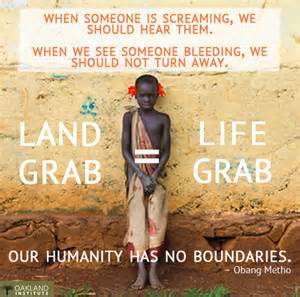 crisis but have suffered in other ways as their governments have been undermined and their leaders toppled. Afrika suffered under a Scramble once before, at the time of the enslavement of millions of her Sons and Daughters in the Americas, Europe and Arabia. Open your eyes and see the latest Scramble, this one for Afrika’s land and resources, one that has, in fact, already been going on for centuries through the extractive industries (gold, diamonds, coltan and other minerals) and more recently through the acquisition of farmers’ lands for the use by foreign and corporate interests for food export or for the growing of biofuels. The latest theater is the Scramble for Control of Afrika’s Food, one that appears to be hiding behind initiatives like Feed the Future.
crisis but have suffered in other ways as their governments have been undermined and their leaders toppled. Afrika suffered under a Scramble once before, at the time of the enslavement of millions of her Sons and Daughters in the Americas, Europe and Arabia. Open your eyes and see the latest Scramble, this one for Afrika’s land and resources, one that has, in fact, already been going on for centuries through the extractive industries (gold, diamonds, coltan and other minerals) and more recently through the acquisition of farmers’ lands for the use by foreign and corporate interests for food export or for the growing of biofuels. The latest theater is the Scramble for Control of Afrika’s Food, one that appears to be hiding behind initiatives like Feed the Future.
There is much more to look at here. We won’t be able to do it in this article, which is already much longer than a “usual” blog piece. We hope we have been able to keep your attention. We hope we have been able to share some valuable information. As stated above, the links to the articles should give you the opportunity to dig even deeper if you so choose. One final link we’d like to share is to an article by Colkin Todhunter, GMO Agribusiness and the Destructive Nature of Global Capitalism (http://www.globalresearch.ca/gmo-agribusiness-and-the-destructive-nature-of-global-capitalism/5323232), which carries the discussion into a scathing critique of the entire capitalist system. Perhaps that is a rabbit hole to be explored at a later time.
Like this:
Like Loading...
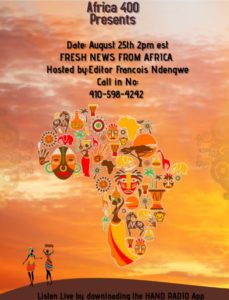 Bro. François Ndengwe hosts a new episode of “Fresh News From Africa” on the Wednesday, August 25 edition of Africa400.
Bro. François Ndengwe hosts a new episode of “Fresh News From Africa” on the Wednesday, August 25 edition of Africa400.
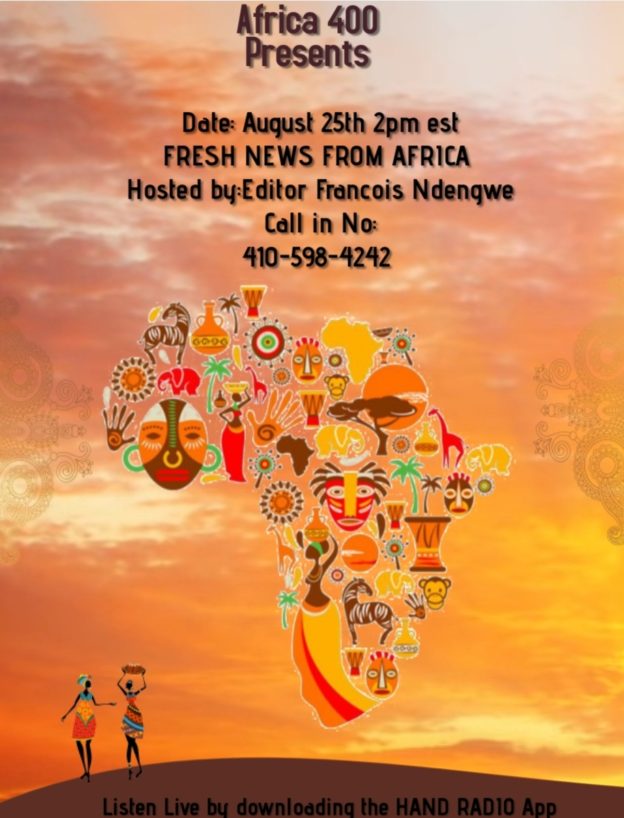
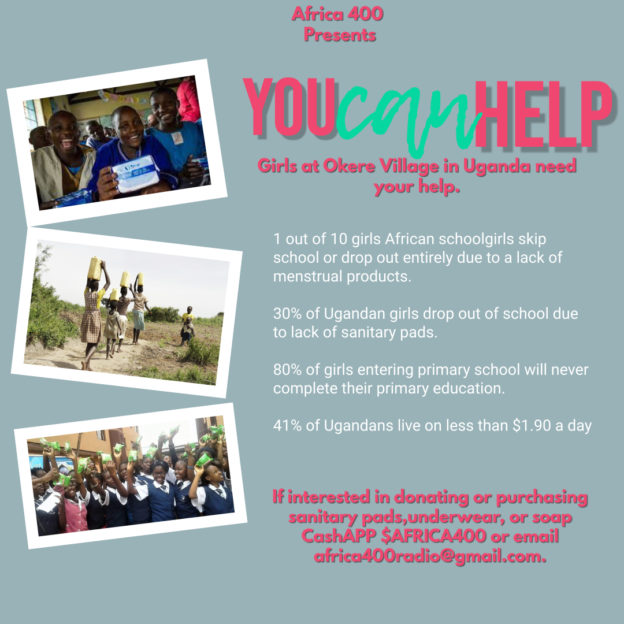
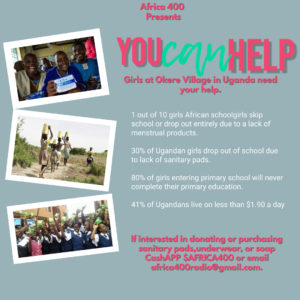
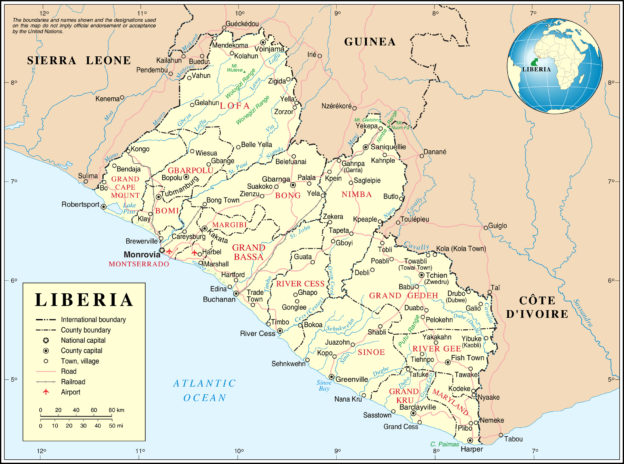
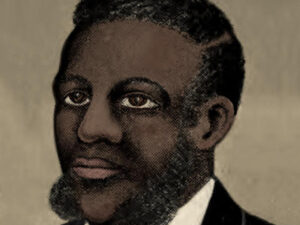

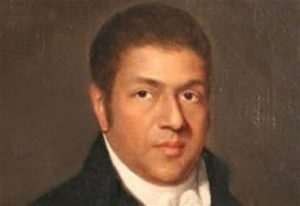
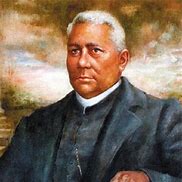
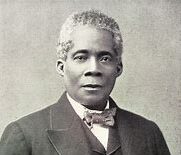
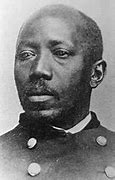

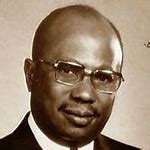
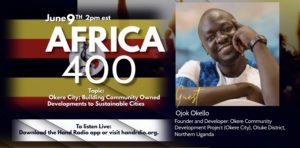
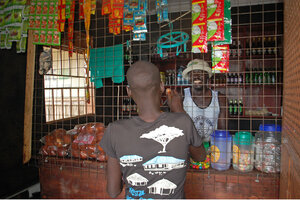 Ojok Okello earned a master’s degree in rural development and worked for international NGOs like War Child UK and the Konrad Adenauer Foundation in England, He earned a second master’s at the London School of Economics.
Ojok Okello earned a master’s degree in rural development and worked for international NGOs like War Child UK and the Konrad Adenauer Foundation in England, He earned a second master’s at the London School of Economics.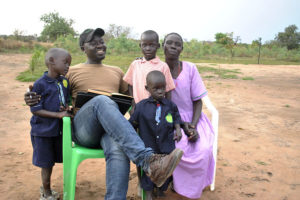 He is co-founder of Refugee Innovation and Sustainable Enterprise – Urban Project (RISE-UP) and Team Leader at its adjunct initiative, RiseUp Hub, a social enterprise with the mission to expand economic opportunities for urban refugees in Uganda. Okello founded Okere City in 2019.
He is co-founder of Refugee Innovation and Sustainable Enterprise – Urban Project (RISE-UP) and Team Leader at its adjunct initiative, RiseUp Hub, a social enterprise with the mission to expand economic opportunities for urban refugees in Uganda. Okello founded Okere City in 2019.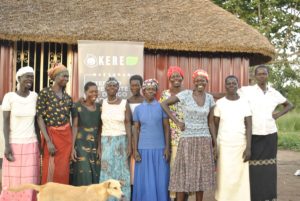
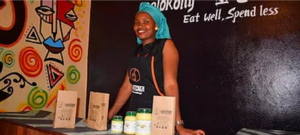

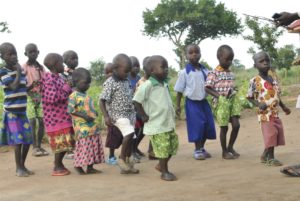
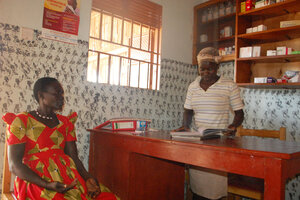
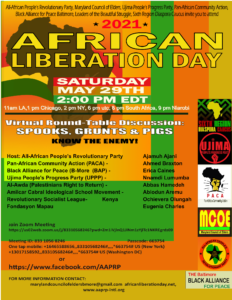
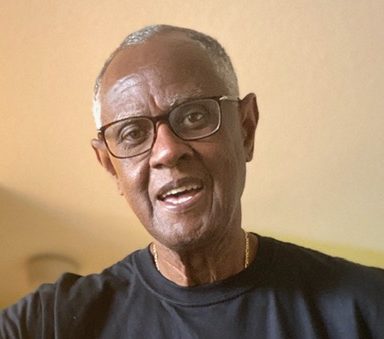 events that have been held over the years by Congress Member Karen Bass (D-California), who is also the current leader of the Congressional Black Caucus (CBC). Mr. Foote has been engaged in lobbying US government officials and international businesses to take a more Afrika-friendly approach to their activities for several decades, choosing to do much of his work “on the inside” to influence policy and practice. Mr. Foote has always approached discussions with Pan-Afrikan activists and fellow concerned Afrikan Diasporans in a positive and cordial manner, and he has often been receptive to a variety of viewpoints regarding the liberation and uplift of Afrikan people. Though he has interacted with more political and corporate types than many activists would care to, he has been a committed, hard-working advocate for Afrikan people for the decades I have known of him and his work.
events that have been held over the years by Congress Member Karen Bass (D-California), who is also the current leader of the Congressional Black Caucus (CBC). Mr. Foote has been engaged in lobbying US government officials and international businesses to take a more Afrika-friendly approach to their activities for several decades, choosing to do much of his work “on the inside” to influence policy and practice. Mr. Foote has always approached discussions with Pan-Afrikan activists and fellow concerned Afrikan Diasporans in a positive and cordial manner, and he has often been receptive to a variety of viewpoints regarding the liberation and uplift of Afrikan people. Though he has interacted with more political and corporate types than many activists would care to, he has been a committed, hard-working advocate for Afrikan people for the decades I have known of him and his work.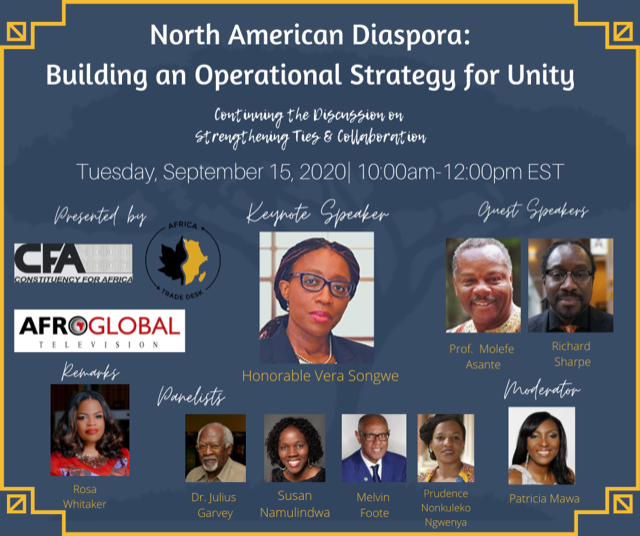 The keynote speaker for this September 15th forum will be the Honorable Vera Songwe, the Executive Secretary for the United Nations Economic Commission for Africa, based in Addis Abeba. Ms. Songwe will be introduced by the Hon. Rosa Whitaker, the President of the Whitaker Group, based in Accra, Ghana and Washington. The forum will also feature the acclaimed scholar, Dr. Molefi Kete Asante, Professor and Chair, of the Department of Africology at Temple University in Philadelphia, and the Co-Founder of the Afrocentricity International.
The keynote speaker for this September 15th forum will be the Honorable Vera Songwe, the Executive Secretary for the United Nations Economic Commission for Africa, based in Addis Abeba. Ms. Songwe will be introduced by the Hon. Rosa Whitaker, the President of the Whitaker Group, based in Accra, Ghana and Washington. The forum will also feature the acclaimed scholar, Dr. Molefi Kete Asante, Professor and Chair, of the Department of Africology at Temple University in Philadelphia, and the Co-Founder of the Afrocentricity International.







